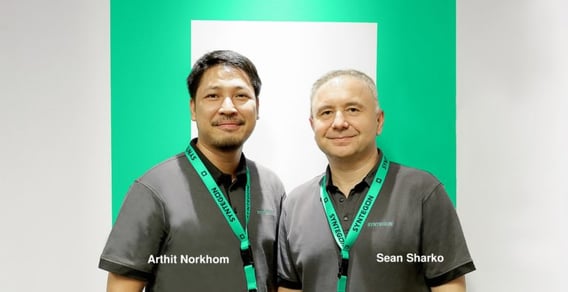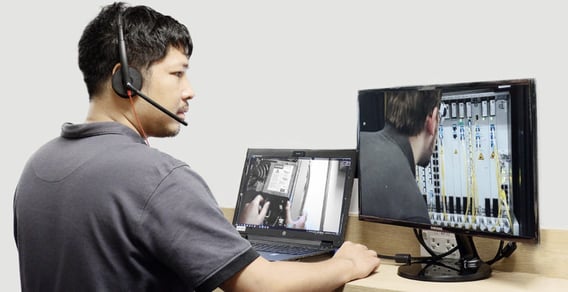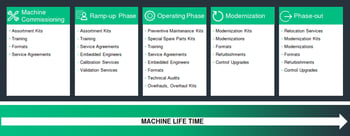Have you ever been desperately waiting for a service technician to fix any of your vital household appliances that unexpectedly stopped functioning?
This is how our customers may currently feel. While in “normal” times, they can rely on our service technicians to support them on site, many field service trips are now cancelled due to the Covid-19 travel bans.
To help customers keep their production up and running in these circumstances, the Southeast Asia Hub launched the Remote Service Assistant (RSA) in April this year. Before rolling it out to selected customers, the team did some extensive testing with their own field service engineers.
Using the Reflekt Remote® app on his smartphone or with augmented reality smart glasses, the on-site technician connects to the Bangkok-based Pharma and Food customer service teams providing audio-visual support in real time.
Through document sharing as well as the chat and video functions, the technical experts in the office can assist and guide the customer’s or their own technician step by step.
About six months after launching the Remote Service Assistant, Arthit Norkhom (head of Field Service and Technical Support for Pharma) and his counterpart for Food, Sean Sharko, are looking back, overwhelmed by the huge success of this new service.
While the tool was initially intended for troubleshooting and breakdown situations where time is of the essence, it is now also applied for the commissioning of machines, training purposes or the installation of format parts, just to mention a few examples. “Actually, we are doings things we have never dreamed of before the corona crisis”, Sean says.
Thanks to their expertise, Arthit’s and Sean’s technical support teams are able to solve a large part of the customers’ requests on their own. Complex queries or questions referring to special equipment are clarified offline with the corresponding CoC (centre of competence). “The experts out there are all happy to help”, they report, adding, “The same applies to our Beringen contact @OliverArnold who is the owner of the Remote Service Assistant”.
So far, about 50 customers located in Asia and the Pacific region have made use of the Remote Service Assistant. Before establishing a remote service agreement with Syntegon and purchasing the optional Vuzix smart glasses, the companies are provided with the tool for testing. In addition, they get free initial training. “This allows us to find out if there are any restraints in terms or network accessibility or Wi-Fi, which is actually the only precondition for using the system. If customers want to use their own tools such as Zoom or Microsoft, we are flexible and try to accommodate them as much as possible”, Sean explains.
This approach has worked out well, and the feedback is great. “Both the pharmaceutical and food producers are extremely pleased with this service, some of them have even sent us thank-you notes”, Arthit emphasizes.
Due to the large distances in the Asia-Pacific region, it often takes the service engineers one or two days to get to the customers’ site, which is equivalent to high travel costs. With the new tool, the SEA Hub could even reach customers that, in the past, did not use their field service due to costs or availability.
For the Remote Service Assistant, customers only pay an annual access fee, which is negligible, and the defined hourly rates for the usage of the service.
Although the Remote Service Assistant is easy to use and many issues can be resolved remotely, both Arthit and Sean are of the opinion that the new platform will never fully replace physical field service visits but rather complement them. “For the fine-tuning and final optimization of a machine, our field service guys still need to be on site”, the technical experts agree.






